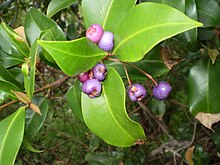Syzygium oleosum
| Syzygium oleosum | |
|---|---|

| |
| Scientific classification | |
| Kingdom: | Plantae |
| Clade: | Tracheophytes |
| Clade: | Angiosperms |
| Clade: | Eudicots |
| Clade: | Rosids |
| Order: | Myrtales |
| Family: | Myrtaceae |
| Genus: | Syzygium |
| Species: | S. oleosum
|
| Binomial name | |
| Syzygium oleosum | |
| Synonyms[1] | |
|
List
| |
Syzygium oleosum, common names include blue lilly pilly, Scented satinash, and blue cherry.[2] It is a species of Syzygium tree native to the eastern Australian rainforests and wet sclerophyll forests.
Description
[edit]It is usually a small tree, 4 to 15 m tall. The leaves are opposite, simple and lanceolate to ovate, with a dark glossy upper surface and paler under-surface. The leaves have oil dots and are distinctly aromatic when crushed, with aromas reminiscent of lemons.[3] Its flowers are small and white-cream colored. It produces a purplish red fruit when young, changing to purplish blue when ripe, 13–40 mm in diameter.[4]
Distribution
[edit]A wide distribution range on the east side of Australia. From Cooktown, North Queensland to the Illawarra, New South Wales.[5]
Uses
[edit]The blue fruit can be eaten freshly picked from the tree or cooked. It has a pleasantly crisp texture and is mildly aromatic and sweet. The fruit can also be made into jams, jellies and wine. It is also grown as an ornamental plant.


References
[edit]- ^ "The Plant List: A Working List of All Plant Species". Retrieved 3 February 2014.
- ^ Low, Tim (1991). Wild food plants of Australia. Sydney, NSW: HarperCollinsPublishers. p. 77. ISBN 0-207-16930-6.
- ^ Low, Tim (1991). Wild food plants of Australia. Sydney, NSW: HarperCollinsPublishers. p. 77. ISBN 0-207-16930-6.
- ^ Floyd, A.G., Rainforest Trees of Mainland South-eastern Australia, ISBN 0-909605-57-2
- ^ "Australian Native Plants Society (Australia)".
